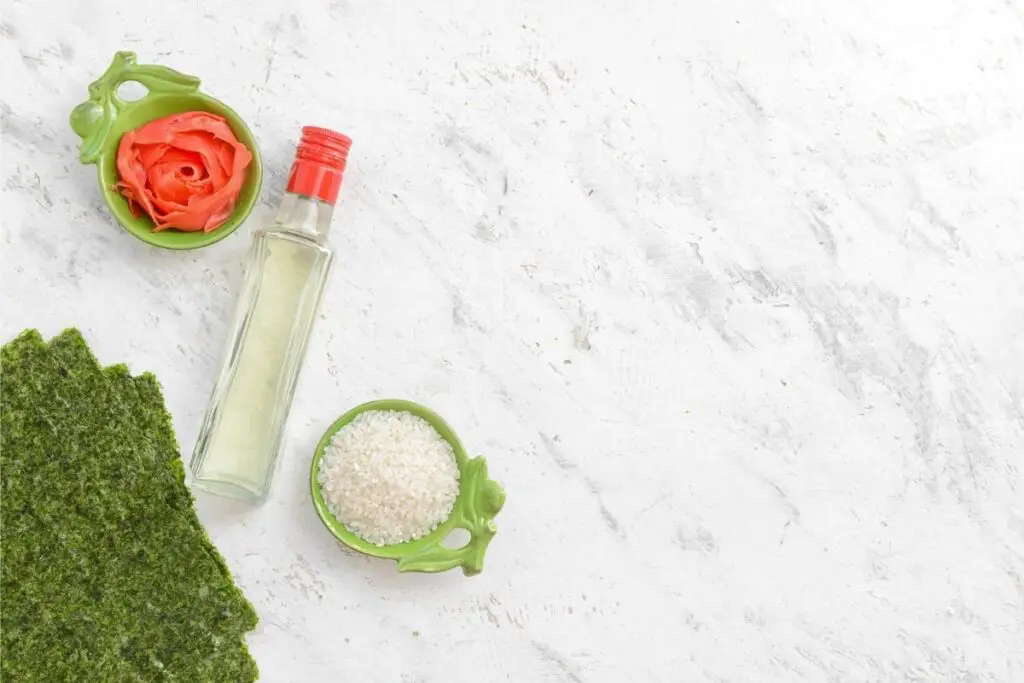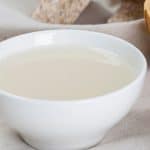In short, the best alternatives to rice vinegar in cooking include white wine vinegar, apple cider vinegar, sherry vinegar, champagne vinegar, lemon or lime juice, etc. I will explain how to use and how much to use below. These substitutes offer various flavors and dietary options, making them suitable for different preferences and dietary restrictions.
Although generally used in small quantities, vinegar has the power to transform dishes with its unique punchy, fruity, and unmistakably acidic qualities. From making marinades and dressings to baking, cooking, and pickling, it’s an important and versatile pantry staple.
With so many types of vinegar available, most home cooks only keep one or two types in the pantry. If rice vinegar isn’t one of them and your recipe calls for it, don’t worry, we’ll help you choose the right substitute from what you have available.
In this guide, we’ll not only help you choose the best rice vinegar substitutes, but we’ll give you some tips on which types of vinegar are best for specific applications and recipes.
Rice Vinegar, Rice Wine, or Rice Wine Vinegar?
Rice wine is alcoholic. It is wine made from rice where the sugars are fermented to turn into alcohol. This is somewhat similar to Japanese sake. Rice vinegar, on the other hand, goes one step further in a second fermentation where it is turned into acid.
Rice vinegar and rice wine vinegar both refer to the same non-alcoholic product which is suitable for cooking only. The alcoholic rice wine, on the other hand, can be used in cooking as well as for drinking.
Rice vinegar has a mild taste, is less acidic than regular white vinegar, and has a slightly sweet flavor. This makes it ideal for adding to marinades, salad dressings, and to pickle vegetables. It is also popularly used in rice dishes (especially sushi), fish and Asian dishes, as well as stir fries.
Different Types of Rice Vinegar
The strength of traditional rice vinegar may vary depending on the type and which Asian region it originates from.
White or regular rice vinegar is the most common multi-use type which is generally available in grocery stores and used in Western as well as Asian cuisines. For the purpose of this guide, we’ll be looking at the best substitutes for white rice vinegar.
Seasoned rice vinegar has added flavorings such as sugar or MSG and is mostly used in sushi rice. Brown, black, and red rice vinegar are the other three types.
The brown variety is made from brown instead of white grains and has a slightly darker color. It is fairly mild and can be used interchangeably with its white counterpart.
The black variety is sometimes used as a dipping sauce with rich umami notes. It is made from a blend of black glutinous rice, wheat, sorghum, and other grains. Similarly, the red kind incorporates other grains and has a sweet and sour taste with a little funk.
Best Rice Vinegar Substitutes
1. White Wine Vinegar
Made from the fermentation of white wine, this is a great rice vinegar substitute in vinaigrettes, marinades, pickles, and sweet-and-sour dishes. The acidic liquid retains some of the wine flavor giving it a fruity and less sour tang, however, it is slightly less sweet than the rice-derived version.
You can substitute it in equal quantities and add ¼ teaspoon of sugar for every tablespoon to match the sweetness level. Besides the above-mentioned applications, it is also popularly used for brining, tenderizing meat, braising, in stews, soup, chutney, hollandaise, and béarnaise sauce.
See more: Replacement for white wine vinegar
2. Apple Cider Vinegar
This is one of the closest matches and can be used with sushi, marinades, sauces, dressings, chicken, stir fry, and pork dishes. It has a pungent acidity, fruity notes, and apple flavor due to being made from fermented apples. It is also suitable for pickled vegetables, stew, and chutney.
It is known for its great health benefits, although you may need to consume more than just a tablespoon in your vinaigrette to reap those benefits.
Replace it in equal quantities and add a ¼ teaspoon of sugar to maintain the same level of sweetness. Be cautious since adding a dash too much can easily overpower another delicate flavor.
3. Sherry Vinegar
Its sweet acidity makes this a great swap, however, it can be bold so save it for dishes that can handle the acid punch and that don’t rely on too many delicate nuances. Replace it in equal quantities as required in your recipe for chicken, steak, and vegetable marinades.
4. Champagne Vinegar
With its mild flavor, this is a great rice vinegar alternative to prevent overpowering other delicate flavors in your dish. It is made from fermented grapes, however, is not directly related to classy French Champagne.
Use this as a straight swap in salad dressings, vegetable dishes, marinades, and preparing spaghetti and marinara sauce.
5. Lemon or Lime Juice
Although they’re not exactly the same, the acidity in these citrus fruit juices can highlight flavors in your dish in a comparable way. It is best to start with small amounts and add more if needed since the flavors can be overpowering. If you need a little more liquid with less punch, dilute the lemon or lime juice with a bit of water.
6. Red Wine Vinegar
This variety has a pinkish color which can affect the color of dressings and may also not be suitable when pickling.
In other dishes where the color is not of importance or where it will blend into a large mix of ingredients, this can be a suitable replacement. It is slightly more acidic so start with less and add gradually if needed.
7. Rice wine
Also made from fermented rice, the wine can be used as a substitute for rice vinegar as long as you keep a few points in mind.
With various rice wines available, the best type to use as a substitute would be a dry wine with a light and clear appearance. In addition, opt for something with a low alcohol content.
You can add just a dash of white vinegar to the wine if you need to increase the acidic flavor. This brings an ideal balance.
Since rice wine contains alcohol, this is only suitable as a substitute in dishes that are going to be cooked for long enough to burn the alcohol off. In other words, if you are making a salad dressing, skip this one!
See more: Rice wine alternative
8. White Wine
If you have a bottle of white wine, you’ve got a suitable rice vinegar replacement on hand for cooked dishes. As with the above option, this will only be suitable in recipes that will be simmered long enough to cook off the alcohol.
Use a dry white wine such as Pinot Grigio or Sauvignon Blanc and avoid ones with very flavorful profiles that may steer your dish’s flavors off track. Replace in equal quantities and add a few drops of lemon juice to increase the acidity if needed. This is best in fish and chicken dishes, marinades, and cooked sauces.
See more: Replacement for white wine in cooking
9. Distilled White Vinegar
Also referred to as white vinegar, this is a very potent replacement, and we highly recommend blending it with white wine, broth, or water and adding a pinch of sugar to make a suitable substitute.
It is not the best alternative, but if it is all you have it can work as long as you dilute it, add sparingly, and taste as you go to ensure you get the right balance.
10. Bouillon
Chicken broth prepared from stock cubes can be made with half the amount of water called for to intensify the flavor. Although this doesn’t provide acidity, it does bring another flavor dimension and is suitable to use as a straight swap in soups, stews, and sauces.
Add a few drops of lemon juice to bring the acidity needed.
11. Balsamic Vinegar
Although not suitable for all applications, this option can be used as a last resort in marinades, grilled meat seasonings, fish dishes, and some dressings. Balsamic is best diluted and used in recipes that won’t undergo too much cooking time.
Since it is more intense in flavor and color, it is recommended to only use a small amount and not to replace the full quantity.
See more: Balsamic vinegar substitute
FAQ
Vinegar is often used in baking recipes to help with rise, contribute to a moist crumb, and airy texture. Rice vinegar is sweeter and has a mild acidity compared to other types, but can be successfully used in most baking recipes. If more tartness is required, you can add a squeeze of lemon juice.
Sushi vinegar is always used to season sushi rice. It is a blend of mild rice vinegar, sugar, and salt. This blend achieves the perfect balance of salty, sweet, and sour.
Rice vinegar is a lot sweeter with nuanced acidity while white vinegar is the most aggressive type available and has a harsh acidity and sourness.
Plain white vinegar is most often used in baking as it has no color or complicated flavors that can change the profile of baked goods. Apple cider vinegar is also popularly used with a sweeter profile.
A suitable substitute for rice vinegar in sushi is a mixture of white vinegar and a small amount of sugar. Combine 1 tablespoon of white vinegar with 1/2 teaspoon of sugar to replace 1 tablespoon of rice vinegar in your sushi recipe.
Conclusion
There are a wide range of vinegar types available, each with its own unique characteristics. When choosing the best substitute for your recipe, consider the role the vinegar plays in your dish and whether the replacement can match the most prominent characteristics.
Add a pinch of sugar if it lacks sweetness, a squeeze of lemon for tartness, or dilute it with broth or water if it is too acidic. By applying these tips, you should be able to incorporate almost any vinegar successfully.
*image by serezniy/depositphotos









